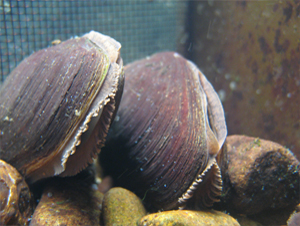
Threats
Factors such as pearl-fishing, loss of habitat, acidification, fertiliser run-off, organic enrichment, loss of host-fish species and pollution are all attributed to declines in the UK population. The fresh water pearl mussel is now classified as a critically engendered species.
Reaching maturity around 12 years old, with a life span of up to 120 years, fresh water pearl mussels possess an interesting and complex life cycle. The larvae attach themselves to the gills of young salmon before settling on the river bed. The juvenile mussels require clean, oxygenated water with a gravel substrate within which they can burrow and continue their development. Given the extended maturation period, the presence of juveniles indicates the presence of structural and functional features of a habitat required for the establishment and longevity of a population.
Protection
Fresh water pearl mussels receive protection under the following legislation:
- The Wildlife and Countryside Act 1981 (as amended).
- The Conservation of Habitat and Species Regulations 2010.
The UK’s freshwater systems are also regulated through:
- The Water Environment (Water Framework Directive), (England and Wales) Regulations 2003.
Designated Sites
England and Wales are each now believed to support only a single recruiting population, however, Scotland is the remaining European stronghold supporting functional populations in over 50 rivers. The sites identified by statutory agencies are of international importance and have been designated as Special Areas of Conservation (SAC) as required by the EU Habitats Directive, and receive strict protection under the UK’s Habitats Regulations.
When do I need to get in touch?
If your project is likely to affect a waterway it should always be assessed for protected species and for any effects to freshwater species, such as fresh water pearl mussels, fish or white-clawed crayfish. Consideration of the presence of fresh water pearl mussel populations and their life stage can have significant implications regarding;
- Project design.
- Consenting requirements.
- Project programme (potential for significant seasonal restrictions).
- Pollution control and monitoring.
- Working methods.
We recommend consideration of potential implications on fresh water pearl mussels at an early stage in project development.
How can EcoNorth Help Me?
EcoNorth uses our extensive experience of informing and overseeing works in freshwater environments to advise on project requirements. Where fresh water pearl mussel surveys are required, EcoNorth has partners who hold the required licence from the appropriate statutory nature conservation organisation to undertake surveys.
We apply best practice guidelines, in-depth knowledge of UK ecology and habitat requirements. We then present the results in our detailed professional reports to inform and support your project planning application or other consenting process.

